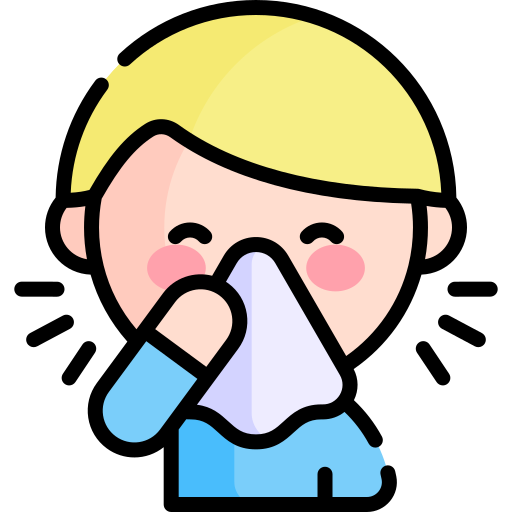Allergic rhinitis (hay fever)
Allergic rhinitis is the most common childhood ailment caused by allergies. Symptoms include a runny and itchy nose, sneezing, postnasal drip and nasal congestion (blockage). A child with allergies may also have itchy, watery, red eyes and chronic ear problems. Even though it’s commonly known as “hay fever,” allergic rhinitis isn’t triggered by hay and doesn’t cause fever.
Nasal congestion
Allergies are the most common cause of chronic nasal congestion (a stuffy nose) in children. Sometimes a child’s nose is congested to the point that he or she breathes through the mouth, especially while sleeping. This may also cause the child to not get a restful night’s sleep and then be tired the next day. If the congestion and mouth-breathing are left untreated, they can affect the growth of teeth and the bones of the face. Early treatment of the allergies causing the nasal congestion may prevent these problems.
Ear infections
Allergies lead to inflammation in the ear and may cause fluid accumulation that can promote ear infections and decreased hearing. A baby whose hearing is impaired for any reason while learning to talk may develop poor speech. Allergies can cause earaches as well as ear itching, popping and fullness (“stopped-up ears”). Anyone with these symptoms should schedule an office visit for further evaluation. Your child may benefit from oral antihistamines or a steroid nasal spray. If this treatment is not effective, then your child may be referred to an allergist for further evaluation.
Food allergies
As many as 6 million children in the United States have some form of food allergy.
If a new mother is breast-feeding, some especially sensitive babies can have allergic reactions to foods their mothers eat. Babies can be tested for allergies. Eliminating these foods from the mother’s diet may provide relief for the child.
The most common allergies in children are to peanuts and milk; other frequently seen triggers include eggs, fish, shellfish (crab, lobster, crayfish and shrimp), soy, tree nuts (for example, pecans, cashews and walnuts) and wheat. The most severe reactions are typically to peanuts, tree nuts, fish and shellfish — all allergies that can last a lifetime. Children often outgrow allergies to milk, eggs, soy and wheat.
All parents of a child with a food allergy should be aware of the possibility of anaphylaxis — a potentially life-threatening reaction that impairs breathing, causes a sudden drop in blood pressure and can send a body into shock. For that reason, most children with food allergies are prescribed epinephrine (adrenaline), administered with an auto-injector as soon as symptoms develop


